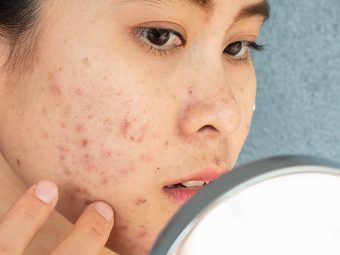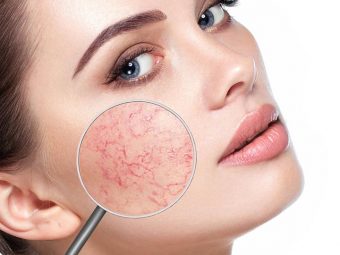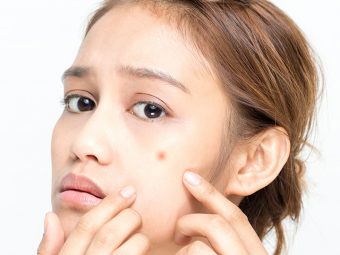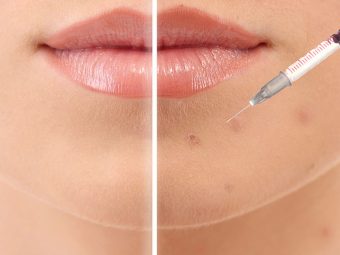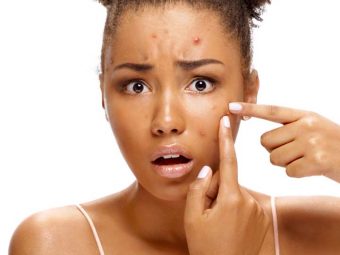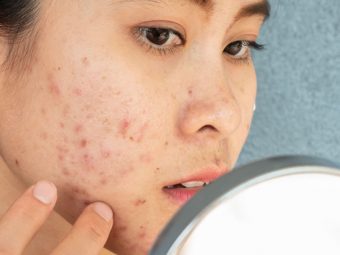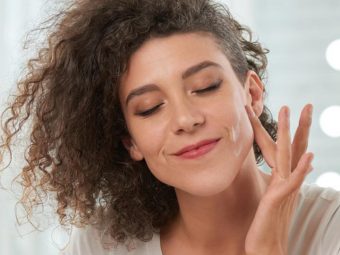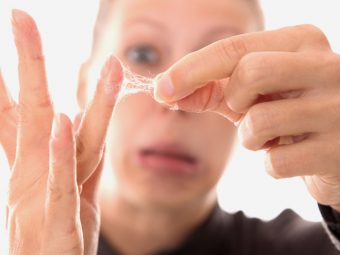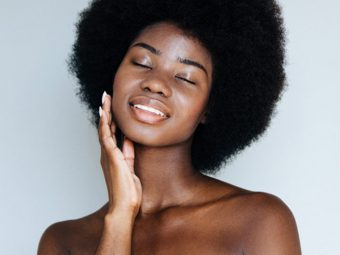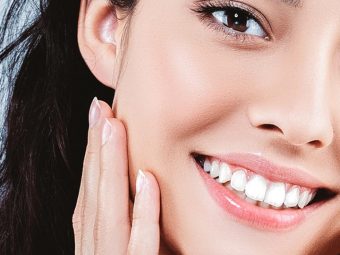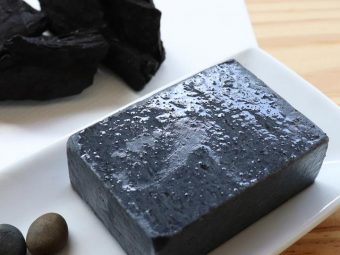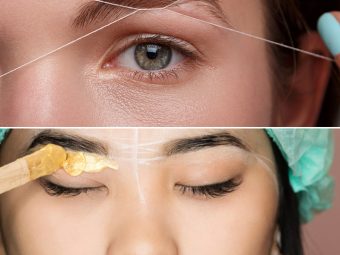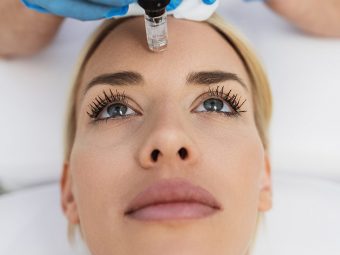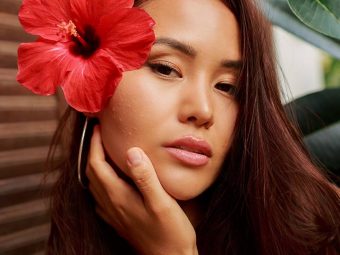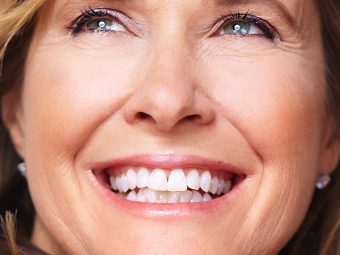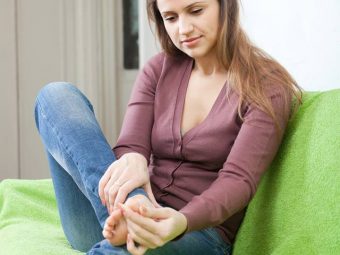Birth Control Pills For Acne Treatment: How They Work & Risks
Kill two birds with one stone as you use oral contraceptives to deal with acne.
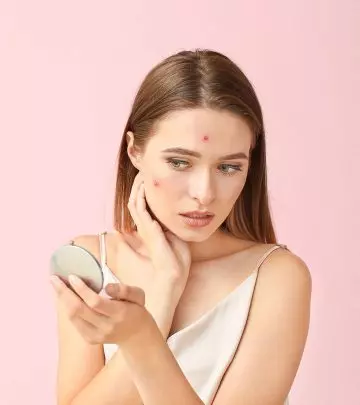
Image: Shutterstock
A common hormonal therapy used to treat acne is oral contraception. Birth contraceptives are extremely effective in treating mild to moderate acne breakouts. However, not all pills can help you manage acne.
Which birth control pills are the best to treat acne? Who can use them and do they have any side effects? In this article, learn all you need to know about birth control for acne treatment, how it works, and the potential risks. Keep reading.
In This Article
Acne, Birth Control, And Hormone Levels
Acne is a skin condition characterized by blackheads, whiteheads, and pimples. It can either be inflammatory or non-inflammatory. One of its main causes is the increase in androgen hormone levels like testosterone, during puberty, in both women and men (1).
Menstrual cycles may also cause acne due to hormonal changes. During puberty, increased androgen levels enlarge the follicular glands. The androgens most linked to acne are testosterone, dihydrotestosterone, dehydroepiandrosterone, and insulin growth factor. High levels of these androgens may lead to acne breakouts. They may also occur if the estrogen and progesterone levels are lower than normal androgen levels. Prepubertal girls also may suffer from acne due to high levels of dehydroepiandrosterone sulfate (2).
Acne mostly occurs during adolescence. But it can also occur in older women and pregnant women. Those with Cushing’s syndrome, hirsutism (excessive hair growth), or polycystic ovary syndrome may also experience acne breakouts (1). The skin condition can also occur during menopause (called acne climacterica). It happens when testosterone levels are greater than estradiol and progesterone levels. Women also experience acne during their late reproductive years due to decreased estrogen levels and no change in androgen levels.
Hyperandrogenemia is a disorder seen in 5-10% of women during their reproductive ages (3). It occurs due to androgen levels or impaired inactivation of androgen. Polycystic ovary syndrome can be a cause of this disorder.
Birth control or hormonal contraception (oral contraception) can be used to treat medical issues like acne vulgaris caused by hyperandrogenemia (4).
Now that we know what causes acne, we discuss the role of birth control in treating skin conditions in the next section.
 Trivia
TriviaHow Does Birth Control Help Treat Acne?
Birth control contraceptives, specifically combined contraceptives, contain estrogen and progestin. Estrogen can reduce active androgens and prevent testosterone production. Progestin decreases testosterone activity, preventing it from producing dihydrotestosterone (another androgen hormone) (4) . The combination of both prevents the formation of other androgen hormones like dehydroepiandrosterone.
Research supports the use of combined oral contraceptives and antiandrogen therapies to treat acne in females above 14 years of age (2).
Veronika, a blogger, provides an overdue update on her skin since she stopped taking birth control pills in January. She shares her current skin care routine, detailing the cleansers, treatments, moisturizers, and products she uses to address scarring, bacne, and pore size. She mentions, “Perhaps I’m just overreacting because I’m not used to having several blemishes at once, but the kind I get leave marks behind, which is incredibly frustrating (i).”
Hormonal therapy takes longer than other acne treatments (2). Depending on the contraceptive, it may take 3 months to a year to reduce acne (4).
Birth control pills address acne by regulating hormones and reducing sebum production. For insights into the expected timeframe for acne clearance by this method, check out the next section.
How Long Does It Take For Birth Control Pills To Clear Acne?
The timeframe for birth control pills to alleviate acne typically spans six to twelve months of consistent use (4). Combined oral contraceptives with both estrogen and progestins work gradually to regulate hormones, reducing sebum production and preventing acne. Some individuals may experience quicker results, but patience is key. Dermatologists can provide more tailored timelines based on specific hormonal profiles.
 Quick Tip
Quick TipConsistent and continued use of the prescribed birth control is crucial for optimal outcomes. While the duration for birth control pills to clear acne varies, understanding different types of birth control is essential for choosing an approach tailored to individual needs and skin concerns.
Types Of Birth Control
The two major types of hormonal contraceptives are combined hormonal contraceptives and progestin-only contraceptives . These two inhibit androgen production.
1) Combined hormonal contraceptives
Combined hormonal contraceptives comprise two components — estrogen and progestin. They are available as patches, vaginal rings, and pills, and help manage skin changes.
- Chlormadinone acetate was effective in treating mild to moderate acne after 3-12 months of treatment. A study showed a decrease in the number of patients facing acne from 46.5% to 14.9% after 13 cycles of treatment. They did not see the need to seek dermatological help or buy concealers (4) .
- Drospirenone showed improvement in patients after 6 months of treatment. It was more effective than chlormadinone in treating acne, hydration. and skin quality (4).
- In two separate studies, dienogest was found to improve acne breakouts in 52% and 66% of patients, respectively. It was more effective than drospirenone and chlormadinone acetate due to its high antiandrogenic activity (4) .
Dr. Dmitriy Schwarzburg, M.D., Cosmetic Dermatology, says, “While the pill is the most commonly utilized form of contraception, vaginal rings, and patches are also used for a variety of reasons. One of the primary reasons people sometimes opt for a patch or vaginal ring is due to their low-maintenance qualities, to avoid missing a day while taking the pill.”
2) Progestin-only contraception
These contraceptives are available as pills, injections, intrauterine devices, and implants. They do not help improve skin issues and may even worsen skin. An implantable rod (a contraceptive medical device), the size of a thin matchstick containing progestin, may cause acne as a side effect (5).
The FDA has approved only three medications for treating acne — ortho Tri-cyclen, Yaz, and Estrostep (2). Doctors may prescribe many combined oral contraceptives, but not everyone can use these to treat acne.
Who Can Use Oral Contraceptives
People with polycystic ovary syndrome (disorder causing enlarged ovaries) or adrenal hyperplasia (disorders limiting hormone production in adrenal glands) may experience acne. Using oral contraceptives to treat acne in women with these disorders reduces hyperandrogenemia risk and improves skin quality.
Combined hormonal contraceptives can be used to treat mild to moderate acne in most women. Sometimes, doctors may suggest certain tests to check for risks.
While it is clear that contraceptives are effective in treating acne, not all can use them. Read to know more.
Who Should Avoid Birth Control Pills To Treat Acne
Combined contraceptives should not be given to women in the late reproductive stage if they smoke or have hypertension and a BMI higher than 35 kg/m2 (4). They may be at a higher risk of cardiovascular disease and brain stroke. They should take the lowest dose of ethinyloestradiol (Estrogen component).
The World Health Organization states that oral contraceptives should not be given to women who are pregnant, breastfeeding, and have a history of deep venous thrombosis. Women who have liver disease, migraine, breast cancer, hypertension, diabetes mellitus with vascular changes, and long-term immobilization also should avoid them (4). The WHO suggestions also apply to those smoking after the age of 35 years.
As with all medications, using oral contraceptives for acne treatment may also have some adverse effects. We have discussed them in the next section.
Side-Effects Of Birth Controls For Acne
Oral contraceptives may have serious side effects. In one case, a 23-year-old fitness trainer suffered a brain stroke after using them for 3 weeks (4). She recovered after thrombolytic treatment (drugs that dissolve blood clots in major arteries and veins)
Some people who take oral contraceptives may be at a greater risk of venous thromboembolism (blood clots in deep veins) (2). Most combined hormonal contraceptives and spironolactone are safe and can be used to effectively treat adult acne in women. They can be used as monotherapies and adjuvants (applied after initial therapy to boost the body’s immune response). (2).
However, clinical examinations and screenings must be conducted to assess the risk of venous thromboembolism in patients before prescribing medication.
Acne can also be a result of stress, depression, or anxiety. Consult a doctor before taking contraceptives. Some contraceptives may affect the mood of women, which may lead to stress, anxiety, and depression.
Menstrual cycle irregularities, headaches, and emotional strain are a few other side effects. Two separate studies showed oral contraception may result in depression, and one found that it may lead to ovarian cyst formations (2).
Dr. Schwarzburg adds, “If your goal is to reduce acne breakouts, it is best to consult with your dermatologist before getting on birth control, due to additional side effects that may be caused by the pill. For some people, birth control can help with acne breakouts, while for others, it can cause increased breakouts with hormonal changes.”
Hormonal changes during puberty, pregnancy, or due to a medical condition can lead to the development of acne. That is why many doctors recommend birth control for acne treatment. They prescribe combined contraceptives containing estrogen and progestin which prevent testosterone production. People with polycystic ovarian disorder (PCOS) or adrenal hyperplasia are prescribed contraceptive pills to reduce acne and improve skin health. However, pregnant women and people with hypertension should avoid taking any contraceptive pills. While most contraceptives are safe for women to use, consult your doctor before using any to avoid any adverse effects.
Frequently Asked Questions
Does Yasmin help treat acne?
Yes. Studies indicate that Yasmin can reduce acne lesions (6). However, Yasmin is not approved by the FDA (U.S Food and Drug Administration) for acne treatment. Hence, practice caution.
Can Yaz make acne worse?
Yaz is approved by FDA (U.S Food and Drug Administration) for acne treatment. However, in some cases, Yaz may worsen acne before it improves.
Is Diane 35 good for acne?
Diane 35 is used in treating serious acne only when antibacterial treatment proves ineffective. It is recommended that you consult a doctor for further information and the correct dosage (7).
Key Takeaways
- Since acne could also be hormonal, oral contraceptives are a common option to treat and prevent acne formation
- However, not all birth control pills can help with acne.
- While combined hormonal contraceptives can help with acne, progestin-only contraceptives are not advisable.
- Women with high blood pressure, pregnant, breastfeeding, or later childbearing age, should avoid oral contraceptives for treating acne.
Learn the impact of birth control pills on your hormones and acne breakouts from the video below. Know how hormonal changes influence skin health and the potential benefits and considerations when opting for an acne treatment.
Personal Experience: Source
StyleCraze's articles are interwoven with authentic personal narratives that provide depth and resonance to our content. Below are the sources of the personal accounts referenced in this article.
(i) SKINCARE UPDATES: ACNE & THE PILL (OR LACK THEREOF)https://www.veronikasblushing.com/2012/05/skincare-updates-acne-pill-or-lack.html
References
Articles on StyleCraze are backed by verified information from peer-reviewed and academic research papers, reputed organizations, research institutions, and medical associations to ensure accuracy and relevance. Read our editorial policy to learn more.
- A Brief Review on Acne Vulgaris: Pathogenesis, Diagnosis and Treatment https://www.researchgate.net/publication/271072186_A_Brief_Review_on_Acne_Vulgaris_Pathogenesis_Diagnosis_and_Treatment
- A Review of hormone-based therapies to treat adult acne vulgaris in women
https://www.ncbi.nlm.nih.gov/pmc/articles/PMC5419026/ - Diagnosis of Hyperandrogenism: Clinical Criteria
https://pubmed.ncbi.nlm.nih.gov/16772149/ - Use of Oral Contraceptives for Management of Acne Vulgaris and Hirsutism in Women of Reproductive and Late Reproductive Age
https://www.ncbi.nlm.nih.gov/pmc/articles/PMC5925193/ - Birth Control
https://www.fda.gov/consumers/free-publications-women/birth-control





